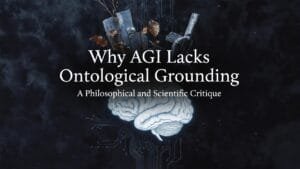Ontological Void: How Enlightenment Epistemology Became the Ministry of Truth

Abstract
This paper argues that modern epistemology, born in the Enlightenment, operates less as a neutral inquiry into knowledge and more as an institutional mechanism for controlling and legitimizing truth. The Enlightenment’s removal of truth’s teleological grounding replaced divine or natural purpose with procedural authority, creating a system in which truth is validated only through recognized institutions. Michel Foucault’s postmodernism, far from dismantling this system, perfected it by reducing truth to a function of power. This evolution—from purposeful truth to ontological void—has produced conditions in which reality itself is whatever institutional authority declares it to be.
Introduction
The Enlightenment is celebrated for freeing human thought from religious dogma, grounding truth in reason and empirical observation. Yet, this transformation did not abolish gatekeeping—it merely transferred it from the Church to secular institutions. Modern epistemology, far from being a neutral discipline, became a procedural priesthood, with universities, academies, and governmental agencies deciding what may be recognized as truth. In postmodern thought, particularly in Michel Foucault’s work, even the pretense of truth’s independence is abandoned, leaving reality entirely at the mercy of institutional power.
The Loss of Telos
In premodern philosophy, truth was anchored in telos—a final cause grounded in divine order or natural law. To know the truth was to align oneself with an ultimate good. Aristotle’s account of causality placed final cause alongside material, formal, and efficient causes as necessary for understanding anything fully. By removing telos, the Enlightenment left truth without intrinsic purpose, reducing it to a procedural outcome rather than a moral or existential orientation.
Contradictions at the Heart of Enlightenment Epistemology
Aristotle’s Law of Non-Contradiction holds that something cannot both be and not be in the same respect at the same time. Enlightenment epistemology violated this principle by claiming that truth is both objective—existing independently of human authority—and yet dependent on institutional approval for legitimacy. If truth depends on authority, it cannot be fully objective; if it is truly objective, institutional approval is irrelevant. This contradiction built instability into the modern conception of knowledge from the outset.
Foucault’s Postmodern Inheritance
Michel Foucault’s theory of power/knowledge appeared to challenge Enlightenment authority but in reality extended it. By declaring that truth is entirely a construct of power, he removed any ontological basis for truth independent of institutional narratives. In doing so, he closed the final escape hatch: if truth does not exist outside power, there is nothing against which power can be judged. His critique thus became a tool for the very institutions it described—absorbed into academic curricula, shaping discourse, and refining methods of narrative control. Foucault became the philosophical successor to the Enlightenment’s original deception, replacing procedural objectivity with outright ontological negation.
The Ministry of Truth in Modern Form
George Orwell’s Ministry of Truth in Nineteen Eighty-Four rewrites history to suit the ruling Party’s needs. Modern epistemology, both Enlightenment and postmodern, performs a subtler version of this task. It determines what counts as knowledge, erases or delegitimizes rival perspectives, and reframes censorship as fact-checking. The difference is that Orwell’s Ministry admitted its manipulative role, whereas institutional epistemology insists upon its neutrality.
Conclusion
The Enlightenment’s claim to liberate truth concealed a deeper transformation: the replacement of telos with institutional authority. This authority, under the guise of procedural objectivity, centralized control over what counts as reality. Foucault’s postmodernism perfected this system by denying truth’s existence apart from power, creating an ontological void in which reality is nothing more than the dominant narrative. The result is a modern Ministry of Truth—cloaked not in propaganda, but in the language of reason.
References
Aristotle. (1998). Metaphysics (H. Lawson-Tancred, Trans.). London, UK: Penguin Classics. (Original work published ca. 350 B.C.E.)
Foucault, M., & Gordon, C. (Eds.). (1980). Power/knowledge: Selected interviews and other writings, 1972–1977. New York, NY: Pantheon Books.
Nietzsche, F. (2001). The gay science (J. Nauckhoff, Trans.). Cambridge, UK: Cambridge University Press. (Original work published 1882)
Orwell, G. (1949). Nineteen eighty-four. London, UK: Secker & Warburg.





